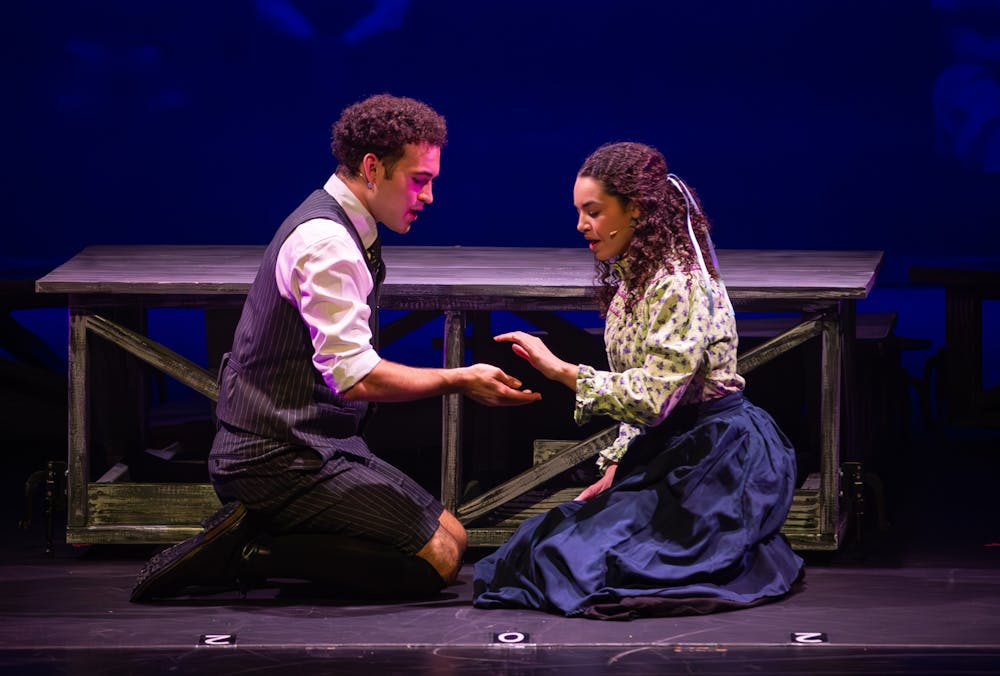When performing arts professor Kim Shively was approached about directing Elon University’s fall main stage musical, “Spring Awakening,” she said she thought about how the musical's message applies to the world today.
“I was looking at all the controversy surrounding pulling books out of libraries,” Shively said. “Not cultivating curiosity in children but rather sticking them in little models and molds and just the rise of authoritarianism and there's nothing more authoritarian than Wilhelm Germany.”
“Spring Awakening” is a rock musical set in 19th century Germany that follows young teenagers navigating their society and sexuality. Elon’s closing performance is at 7:30 p.m. on Nov. 4 and tickets are available through the university’s ticketing website for $15 or free with an Elon ID.
Shively said beneath the layers of teen angst, the musical serves as a cautionary tale of what happens when people don’t cultivate curiosity, conversation and understanding.
Shively, who saw the original off-Broadway production, said she was initially cautious when approached about directing “Spring Awakening.” As a director, Shively said she grappled with how to tell the story.
Though the story could have easily been presented as a morality piece —where the children have terrible things happen to them as consequences to their actions — Shively said she wanted to present “Spring Awakening” to the Elon community as a tragedy.
“They're doing the best they can and they're exploring and waking up and no one is giving them a roadmap and no one is giving them support.” Shively said. “The tragedy is that when we are not transparent, when we are not open and honest, it is our children that suffer as a collective as a society.”
Elon Law ’23 graduate Alex Swanson attended the production’s opening night performance on Oct. 27 and said while it wasn’t an “emotionally, feel good show,” it is an important story to tell.
“‘Spring Awakening’ is near and dear to my heart. It was sort of my generation's angsty teen musical and so I was really excited that they're doing it,” Swanson said. “It's sad that it's still really poignant, but it's a powerful show. It's a heavy show, but there's a lot to learn from it.”
Shively, who has a background in theatrical intimacy coordination, said she directs productions through a consensual, postmodern feminist lens. She also said that in this production, it was important to her for all of the characters to have nuance and humanity.
“Having that action that the actors are playing be always moving forward and always seeking to fix the problem rather than indulge in the problem is part of what I think makes this Spring Awakening unique compared to the other productions,” Shively said.
Senior Tommy Pegan plays the role of Adult Man and said in a previous interview with Elon News Network the Shively’s guidance, as well as the production’s choreographer and intimacy coordinator, bring a feminist lens to the show. Pegan said Elon’s production aims to give more agency to the female characters.
“They have so much agency in this version, and we haven't changed any of the dialogue. It is just merely the blocking and how they have interpreted the lines,” Pegan said. “It gives the feminine voice in the script so much power, and I think that's what's bringing light to the whole project because — I don't know — it's just so dark on Broadway.”
Pegan said “Spring Awakening” is especially relevant now as there are ongoing controversies about sexual education in schools and abortion legislation.
“This is a really important piece for the area that we're in specifically and I think that the way that it is being handled won't scare people as much as it will inform them, which is really what the purpose of the play is,” Pegan said.
Pegan said he hopes people who see the show learn from it and connect with it — especially the themes explored in the musical’s final number, “The Song of Purple Summer.”
“This happened in the past, this is how we used to be. Look at it, study it, don't let this happen again.” Pegan said. “Understand that life continues, even through the darkest tragedies.”
Shively said she hopes anyone who saw the show, or plans to see the final performance, is able to leave McCrary Theatre with hope and a call to action.
“I hope that they walk out and they think about before they make a judgment about someone, they think about what shoes they're walking in, what their experience of humanity might be, how they're being ushered through this world,” Shively said. “That they are challenged to take action and be informed and be curious and not passive participants in our democracy.”


